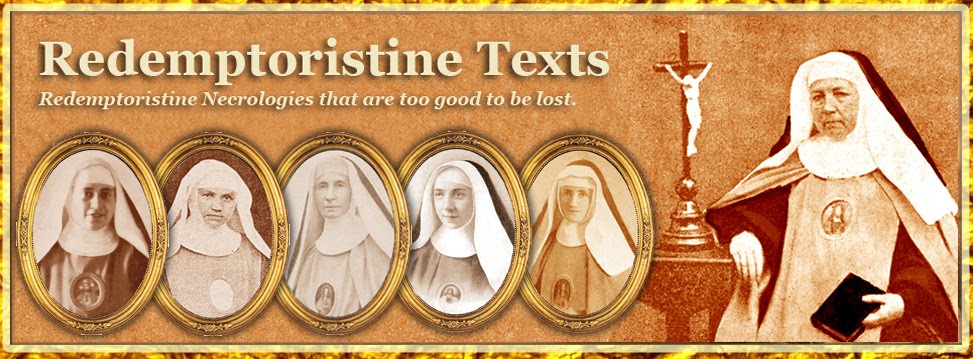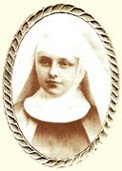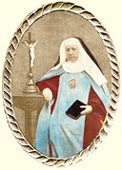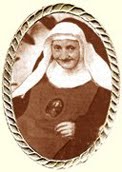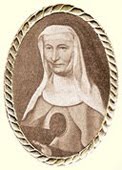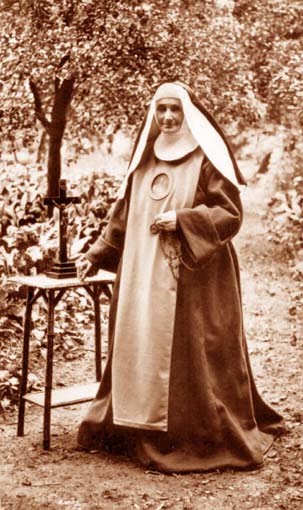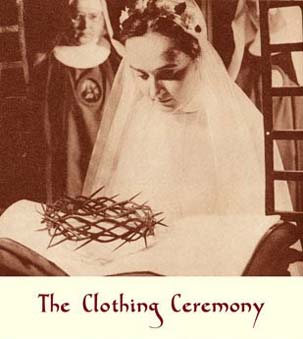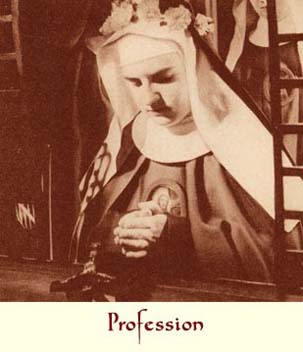Foundress of the Convent of the Redemptoristines of Velp, near Grave, founded in 1858
Chapter II. In a foreign land.
The time of trial began for Celestine from the moment she entered the convent. There she was in a foreign land, far from the paternal home and everyone who was linked to her by ties of blood. People there could only understand her with a great deal of difficulty, and there was hardly a religious who understood French. Everything was strange to her – the regulation of the house, the people, the kinds of food, and the language. It was a whole new world that opened before her. In spite of this, her courage, her strength of soul, her confidence in God and in this adorable Providence which had always directed her, did not abandon her, but on the contrary, helped her to overcome all the difficulties.
Following the prescriptions of the Institute, she had to begin her religious life in the “Educandate”, in order to receive the first notions concerning the foundations of the spiritual edifice she had to construct. The Educandate is the preparation for the Novitiate. The difficulties she had to surmount can only be conjectured by the several details we can give in a few words. Her mistress knew only a little French, and Celestine scarcely knew any German, so if there was anything that she had to ask or say, she had to have recourse to her dictionary each time. However, she found a charitable father and wise counsellor in the Very Rev. Father Passerat, who had also come to Vienna, and from time to time gave a conference to the community. One day, right at the beginning of Miss Platton’s educandate, in an informal discussion, she naively said that a great difficulty for her came from the difference that existed between Austrian and Belgian food. At Tirlemont, for example, as she said, she had been accustomed to eating slices of bread and butter, while at Vienna this custom did not exist among the Sisters. Good Father Passerat was able to resolve this difficulty very quickly. On the evening of that same day, Celestine saw, to her great astonishment, placed in front of her alone, slices of bread and butter.
In the midst of these little crosses, one thing consoled her and gave her strength and courage to the point where she declared she was blessed even in her trials. This consolation she found right where her heavenly Spouse deigned to dwell hidden in His mystery of love, that is to say, with Jesus Christ in the Tabernacle, and also with Her who, from the highest heaven, watched over her like a mother over her child, took the place of her mother on earth, and surrounded her with her maternal care. This was her good and tender mother Mary.
In one of the cloisters of the Monastery there was a beautiful image of the Blessed Virgin holding the infant Jesus on her lap. The Sisters called it the Mother of the House. It was there especially that Celestine went to pour out her heart, and it was there that her Mother consoled her. It was there that she repaired her strength and drew courage and consolation to accomplish the will of the Lord and remain faithful to Him. She felt herself truly happy in this new life that she had embraced, in spite of all the difficulties that she had to overcome every day. This is what she expresses clearly in a letter to her parents that she sent them during her Educandate. “I have learnt with joy,” she told them, “that my sister Irma also wishes to become a Redemptoristine, but that she knows German well, and that she will soon come here to our Convent of Vienna.” Sometime later, Irma made her entry into the house at Bruges, and late she went on to Velp, where Celestine had become the Superior, and she is still there today. (1883).
However, her time in the Educandate was coming to an end, and the day came when Celestine was to begin her Novitiate and receive the Redemptoristine habit. And indeed she did receive it, from the hands of the coadjutor Bishop of Vienna, Mons. Matthias Pollitzer, on 29th October 1846. Following the custom of the Congregation, she received her name in religion at the same time – it was that of Sister Marie-Cherubine of the Holy Spirit.
Filled with a holy ardour, she then began her Novitiate, and soon found her greatest delight in all the exercises of the contemplative life and mental prayer. And so she proceeded rapidly along the way of perfection. The Mistress of Novices did not tire of praising her when she spoke of the virtues of Sister Marie-Cherubine. In a letter to the Mother Superior of Bruges, Marie-Philomene, she expressed herself pretty much in these terms: “Sister Marie-Cherubine lives a life totally hidden in God.” These few words give us evidence that Celestine had given herself entirely to God, for whom she had left everything that she held dear in the world, and that she was entirely penetrated by the spirit of the Congregation. And indeed this spirit requires the Sisters to consecrate themselves to the hidden life and the life of sacrifice of which our divine Saviour gave a signal example for thirty years.
After a year of regular exercises, Sister Marie-Cherubine was admitted to the profession of her holy vows on 6th November 1847. On this occasion she received the blue scapular and the mantle of the same colour, with the black veil, the crown of roses and the gold ring, the sign of the Spouses of the Most Holy Redeemer.
Sister Marie-Cherubine had therefore attained her aim, and the object of her desires. The end had crowned the work; the reward had followed the pains and sacrifices. With her whole heart she was now able to say with the Spouse in the Canticles: “I have found Him whom my heart loves, I have Him, I possess Him. I shall never leave Him again.” (1 Ct. III, 4).
The newly Professed was now part of the community of Vienna. All the Sisters held her in great esteem. They were all disposed in her favour, because of her sweet and affable manner, her piety and her placidness of soul. Happy in her vocation, she was full of gratitude towards God for this inestimable grace, for the wise conduct of her paternal Providence who had directed her, by marvellous ways, towards the end she desired so much. It seemed that she would now spend her days in the Mother House of Vienna in peace and affectionate rapport with God in prayer and good works done for the salvation and conversion of poor sinners. But this peaceful happiness was not to last long. A very heavy trial was about to engulf her. Happily, she was solid in virtue and the habit of recognizing in every event the will of God and His wise Providence, and so she could abandon herself to this divine Providence in the midst of the critical circumstances in which she was soon to find herself.
Following the prescriptions of the Institute, she had to begin her religious life in the “Educandate”, in order to receive the first notions concerning the foundations of the spiritual edifice she had to construct. The Educandate is the preparation for the Novitiate. The difficulties she had to surmount can only be conjectured by the several details we can give in a few words. Her mistress knew only a little French, and Celestine scarcely knew any German, so if there was anything that she had to ask or say, she had to have recourse to her dictionary each time. However, she found a charitable father and wise counsellor in the Very Rev. Father Passerat, who had also come to Vienna, and from time to time gave a conference to the community. One day, right at the beginning of Miss Platton’s educandate, in an informal discussion, she naively said that a great difficulty for her came from the difference that existed between Austrian and Belgian food. At Tirlemont, for example, as she said, she had been accustomed to eating slices of bread and butter, while at Vienna this custom did not exist among the Sisters. Good Father Passerat was able to resolve this difficulty very quickly. On the evening of that same day, Celestine saw, to her great astonishment, placed in front of her alone, slices of bread and butter.
In the midst of these little crosses, one thing consoled her and gave her strength and courage to the point where she declared she was blessed even in her trials. This consolation she found right where her heavenly Spouse deigned to dwell hidden in His mystery of love, that is to say, with Jesus Christ in the Tabernacle, and also with Her who, from the highest heaven, watched over her like a mother over her child, took the place of her mother on earth, and surrounded her with her maternal care. This was her good and tender mother Mary.
In one of the cloisters of the Monastery there was a beautiful image of the Blessed Virgin holding the infant Jesus on her lap. The Sisters called it the Mother of the House. It was there especially that Celestine went to pour out her heart, and it was there that her Mother consoled her. It was there that she repaired her strength and drew courage and consolation to accomplish the will of the Lord and remain faithful to Him. She felt herself truly happy in this new life that she had embraced, in spite of all the difficulties that she had to overcome every day. This is what she expresses clearly in a letter to her parents that she sent them during her Educandate. “I have learnt with joy,” she told them, “that my sister Irma also wishes to become a Redemptoristine, but that she knows German well, and that she will soon come here to our Convent of Vienna.” Sometime later, Irma made her entry into the house at Bruges, and late she went on to Velp, where Celestine had become the Superior, and she is still there today. (1883).
However, her time in the Educandate was coming to an end, and the day came when Celestine was to begin her Novitiate and receive the Redemptoristine habit. And indeed she did receive it, from the hands of the coadjutor Bishop of Vienna, Mons. Matthias Pollitzer, on 29th October 1846. Following the custom of the Congregation, she received her name in religion at the same time – it was that of Sister Marie-Cherubine of the Holy Spirit.
Filled with a holy ardour, she then began her Novitiate, and soon found her greatest delight in all the exercises of the contemplative life and mental prayer. And so she proceeded rapidly along the way of perfection. The Mistress of Novices did not tire of praising her when she spoke of the virtues of Sister Marie-Cherubine. In a letter to the Mother Superior of Bruges, Marie-Philomene, she expressed herself pretty much in these terms: “Sister Marie-Cherubine lives a life totally hidden in God.” These few words give us evidence that Celestine had given herself entirely to God, for whom she had left everything that she held dear in the world, and that she was entirely penetrated by the spirit of the Congregation. And indeed this spirit requires the Sisters to consecrate themselves to the hidden life and the life of sacrifice of which our divine Saviour gave a signal example for thirty years.
After a year of regular exercises, Sister Marie-Cherubine was admitted to the profession of her holy vows on 6th November 1847. On this occasion she received the blue scapular and the mantle of the same colour, with the black veil, the crown of roses and the gold ring, the sign of the Spouses of the Most Holy Redeemer.
Sister Marie-Cherubine had therefore attained her aim, and the object of her desires. The end had crowned the work; the reward had followed the pains and sacrifices. With her whole heart she was now able to say with the Spouse in the Canticles: “I have found Him whom my heart loves, I have Him, I possess Him. I shall never leave Him again.” (1 Ct. III, 4).
The newly Professed was now part of the community of Vienna. All the Sisters held her in great esteem. They were all disposed in her favour, because of her sweet and affable manner, her piety and her placidness of soul. Happy in her vocation, she was full of gratitude towards God for this inestimable grace, for the wise conduct of her paternal Providence who had directed her, by marvellous ways, towards the end she desired so much. It seemed that she would now spend her days in the Mother House of Vienna in peace and affectionate rapport with God in prayer and good works done for the salvation and conversion of poor sinners. But this peaceful happiness was not to last long. A very heavy trial was about to engulf her. Happily, she was solid in virtue and the habit of recognizing in every event the will of God and His wise Providence, and so she could abandon herself to this divine Providence in the midst of the critical circumstances in which she was soon to find herself.
This necrology is translated from Fleurs de l'Institut des Rédemptoristines by Mr John R. Bradbury. The copyright of this translation is the property of the Redemptoristine Nuns of Maitland, Australia. The integral version of the translated book will be posted here as the necrologies appear.
